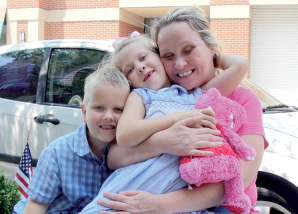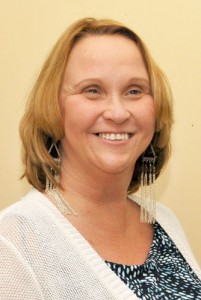

•Cry Purple is available for purchase at Amazon.com
•For more about Christine, visit www.crypurple.com or www.facebook.com/crypurplebook
By LESLIE COLLINS
Northeast New
September11, 2013
“Hey, pancake face!”
Christine McDonald’s classmates snickered and stared as she walked down the hallway, her eyes cast downward.
Every day tore at her being. As a child, her facial features appeared flattened and she suffered from unbearable joint pain due to Stickler syndrome. While her classmates called her other names, the most damning name came from her mother who called her “mentally retarded.”
Those two words stuck with her for years and planted a seed of self-doubt, a feeling of unworthiness. She gave up in school and it wasn’t until years later, well into her adulthood, that she learned she possessed an above average IQ.
With a dysfunctional home life, McDonald first ran away from home at the age of 13. By the age of 15, she learned how to stay under the radar and not get caught.
By her teens, her facial features had filled out and she learned how smiling and flirting with men could pay off. Soon, she turned to stripping and for the first time she felt special. She liked the glittery outfits, the way men looked at her, the way they wanted her. On stage, she grabbed the center of attention. Men tipped her with pills, cash and cocaine. She needed the high, she needed to drink and it cost her a number of stripping jobs. Cocaine had entrapped her, its grasp so tight it consumed her thoughts and actions. To feed her habit, she turned to the streets, working as a prostitute for nearly two decades in Oklahoma City and Kansas City’s Historic Northeast.
In Kansas City, Independence Avenue became her home. Lost in her addiction, the darkness of the streets beckoned her. She didn’t care about eating or drinking, it was all about the chase – the chase of the men to chase the high.
“Somebody was shot beside me. I was covered in brain matter and it wasn’t enough for me to quit (cocaine),” she said. “I’d been stabbed and beaten and left in trunks in cars and just all these things, and none of it was enough.”
•••
Now in her forties, McDonald has left behind prostitution and drugs and recently published a book, “Cry Purple.” In her book, she doesn’t beg for pity, but inevitably, her story tugs at the heart strings and evokes emotion. It’s a raw, gritty account of her journey through addiction, prostitution and prison. It also tells of her difficult pregnancies, becoming legally blind and the joy of motherhood.
In one word McDonald is resilient. She’s candid, upbeat, animated. Her laugh and smile are infectious, and she jokes about being blonde.
“Sometimes blonde is a lot worse than being blind,” she said with a laugh.
One of her next projects, she said, is writing a cookbook. She’s already picked out a name: “Easy-peasy cooking, so easy a blind blonde can do it.”
All of the recipes are tried and true and cheap, she said.
For now, however, her focus is on “Cry Purple” and educating the public about prostitution and addiction.
Women don’t become prostitutes because they like sex, she said. It’s about survival, feeding an addiction or running away from something so awful that living on the streets is a “better life than where they came from.”
“I think when people see the women on the streets, they see them as a nuisance and an eyesore without seeing them as a fellow human with a story. They’re still people,” McDonald said. “I know a lot of prostitutes and I don’t know many prostitutes that are happy doing what they do.”
Being raped and beaten are part of the day-to-day work hazards, she said, and the average lifespan of a girl working the streets is 11 years. If you make it past 11, consider yourself lucky.
Prostitutes are easy targets because, “Who’s going to look for a prostitute? Most of them are out there because their families have given up hope,” she said.
A number of McDonald’s friends were murdered. One was shot in the face and other friends were dumped in the Missouri River, their limbs severed.
Asked how it feels to look back on her life and know how far she’s come, McDonald said, “Sometimes I get really sad because so many of my friends never left the streets. And um, some of them left but didn’t leave alive.” She sniffled as tears rolled down her face.
“There’s so many people out there that don’t know they have value and worth,” McDonald said. “So many people don’t even get the chance to have a glimmer of hope to know they’re not hopeless, that they’re worthy and they’re worth it. And that makes me sad.”
McDonald said she’s humbled and thankful for what she has now.
Instead of digging in trash cans or stealing food, she now shops at the grocery store. Instead of urinating on the side of the road, she uses a bathroom. There were a number of times that people of authority deemed her hopeless, but McDonald pointed out that for someone who’s lived on the streets for years, transitioning back to productive society is like taming a wild animal.
In fact, McDonald didn’t fill out a job application until the age of 36.
“How does that work?” she said. “I’ve been a prostitute for 20 years. What do I have, sales experience? How does this work for me?”
Her first job was at McDonald’s off of Front Street and the manager asked her, “I noticed you don’t have a work history here. Were you a homemaker or something?”
“Yeah, something like that,” she said.
•••
As McDonald talked, her chandelier earrings glistened in the light, dangling below her shoulder length hair which she wore parted to the side. Her makeup was flawless and her blackdress with white and turquoise accents complemented her eyes. One would never guess both of her eyes were prosthetics.
In 2005, McDonald became legally blind within 72 hours in both eyes as a result of a rare genetic condition she developed called Vogt-Koyanagi-Harada (VKH) disease. Having Stickler syndrome only compounded the VKH. McDonald was pregnant at the time and decided not to take the drugs to relieve the eye inflammation and possibly save her eyes in order to protect the health of her baby, Mary Christine. Early on in the pregnancy, McDonald learned she had massive fibroid tumors that could endanger Mary Christine. Adding to the blow, the doctors then told her that Mary Christine had Pierre Robin Sequence, which meant that the lower cranial facial part of her skull had not developed, among other issues. Still in prison and unable to financially care for Mary Christine, McDonald gave up her daughter for adoption and now has contact with the adoptive family and Mary Christine on a regular basis.
When McDonald’s next child, Ricky, was only five weeks old, doctors removed her right eye. Not only was she learning how to be a first-time mother, she was learning how to live blind. Doctors removed her other eye three years later. McDonald isn’t bitter about her blindness.
“If you’re going to go blind, I went blind in the right decade,” she said with a laugh, referring to the latest adaptive technology.
She does, however, long to see her children. She longs to see their faces, their smiles, their expressions. More than anything, she would love to see them, just once.
•••
With a criminal background of felony drug and prostitution charges, finding employment is not an easy task. McDonald earned her GED and attended three semesters of college but dropped out due to the demand of a full-time job and caring for her son, Ricky.
From 2008 to 2012, she worked for the non-profit Community Employment Inc. and worked her way up to program supervisor. In 2012, the Missouri non-profit lost state funding and closed its offices statewide. Since that time, McDonald has remained unemployed, continuing to face roadblocks.
“The biggest barrier is not my blindness. I can whip out a laptop and show people. The biggest barrier is my past,” she said.
McDonald remains active in a number of organizations, including those that reach out to the homeless and sexually exploited individuals. Recently, she was appointed to Missouri’s State Advisory Council for Alcohol and Drug Abuse and will serve on the council through August of 2016. For her appointment, she even received a letter from Gov. Jay Nixon.
•••
Since McDonald lived on the streets for nearly 20 years, her credit history is less than stellar. Interested in applying for a home loan, she visited a local bank and the loan officer looked at her credit report incredulously. “It’s like you were just born. Where have you lived?” the bank representative asked. McDonald replied, “In a park.”
McDonald plans to use proceeds from her book to purchase a trailer home with a backyard for her and Ricky, now seven. Currently, they live in a small, one bedroom apartment in the St. Louis area.
Purchasing a trailer home would give Ricky his own bedroom and enough space to have a guide dog for McDonald.
“He is my amazing little helper,” she said of Ricky. “We have a very interesting mother-son relationship because we have to be partners, we have to be a team. I don’t want him to always have that responsibility. I want him to have a chance to be a kid.”
Having a guide dog would give Ricky that chance, she said.
“I don’t need a house in suburbia. I just want a little trailer and a yard. A tree would be nice…” she said.
McDonald doesn’t fret too much because she knows God has a plan.
“I don’t know what that plan is; I have no idea, but for some reason I did make it off the streets,” she said. “So, I will continue seeking work. I have faith, and I know that God will open a door.”


















